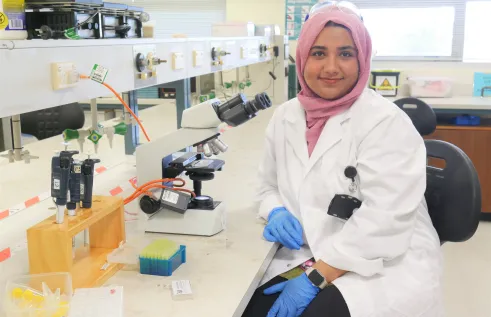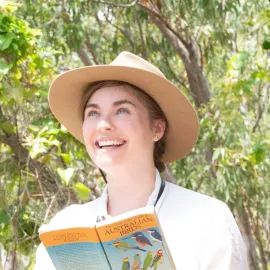Key details
Duration
Intake
Locations
Entry requirements
View full entry requirementsCredit points required
80Course code
Overview
The Diploma of Science is ideal if you are curious about studying science and would like to learn more, but are unsure about committing to a degree, or if you already have a career in the sciences and want to upskill with another qualification and skills in another discipline.
You will explore a variety of science concepts, theories and principles in different fields such as general science, biology, chemistry, environmental science, geographic information science, physics and mathematics until you find the one that resonates with you.
As you progress through your Diploma of Science, you will develop your knowledge of logical and critical thinking, and problem-solving from a scientific and technological perspective.
After completing your diploma, you have the option to move into our Bachelor of Science or Bachelor of Environmental Science courses.
Whether you are in the science field or looking to move into science, or perhaps you are a teacher or engineer wanting to gain knowledge about a specific science discipline, this flexible diploma will help you find what you are looking for.
Career opportunities
Graduating from this course may lead to career opportunities in the industry, government, private companies, non-government organisations (NGO) and the community sector as a biologist, ecologist, spatial scientist, chemist, consultant, laboratory assistant, project manager or advisor.
Credit transfers and advanced standing
Credit transfer
For further information on credit transfer and how to apply visit ASK CDU
Credit transfers and advanced standing
Credit transfer
For further information on credit transfer and how to apply visit ASK CDU
Fees
Commonwealth supported places
Commonwealth Supported places are available in this course to students who meet one of the following residency requirements:
(a) be an Australian citizen, who will complete some of your course of study while resident in Australia; or
(b) a New Zealand citizen; or an Australian permanent visa holder; or an eligible former permanent humanitarian visa holder; who studies the entire course while living in Australia.
Further information about fees and charges can be found at Fees and Payments.
International tuition fees
The annual tuition fee for full time study in 2026 is AUD $36,480.00. This equates to $4,560.00 per 10 credit point unit (0.125 EFTSL).
These fees are subject to increases annually, effective at the start of each calendar year.
You can find a list of International fees and payments you can expect to pay as part of your studies in Australia. See 2026 Higher Education International Annual Tuition Fees.
CDU offers a number of scholarships to international students to assist with the cost of study.

Why study Science, Environmental Science and Management at CDU?
If you're interested in finding solutions to our planet's environmental issues, there's never been a better time to study science, environmental science and management at CDU. You'll be prepared to apply the academic theories and principles you learn in class to real-world problems in a diverse range of careers.
- #3 in Australia for agriculture and environmental studies starting salary (GUG 2024)
- Five-star Australian university for graduate employment outcomes (GUG 2024)
- Choose to study online, on campus, part-time or full-time as it suits you

Why study science, environmental science & management at CDU?
If you're interested in finding solutions to our planet's environmental issues, there's never been a better time to study science, environmental science and management at CDU. You'll be prepared to apply the academic theories and principles you learn in class to real-world problems in a diverse range of careers.
- Five-star Australian university for undergraduate employment outcomes (GUG 2024)
- #3 in Australia for agriculture and environmental studies starting salary (GUG 2024)

Why study Science, Environmental Science and Management at CDU?
If you're interested in finding solutions to our planet's environmental issues, there's never been a better time to study science, environmental science and management at CDU. You'll be prepared to apply the academic theories and principles you learn in class to real-world problems in a diverse range of careers.
- #3 in Australia for agriculture and environmental studies starting salary (GUG 2024)
- Five-star Australian university for graduate employment outcomes (GUG 2024)
- Choose to study online, on campus, part-time or full-time as it suits you

Why study science, environmental science & management at CDU?
If you're interested in finding solutions to our planet's environmental issues, there's never been a better time to study science, environmental science and management at CDU. You'll be prepared to apply the academic theories and principles you learn in class to real-world problems in a diverse range of careers.
- Five-star Australian university for undergraduate employment outcomes (GUG 2024)
- #3 in Australia for agriculture and environmental studies starting salary (GUG 2024)
What will I study?
The Diploma of Science includes one common unit, five specialist elective units and two elective units.
Course structure
The common unit is designed to assist you to gain the academic skills required to make the successful transition to higher education. The focus is on developing the practical skills required for university study. These include: assignment writing, reading and thinking critically, referencing, researching, IT skills, teamwork and communication.
Specialist elective units enable you to study biology, chemistry, ecology, environmental science, earth science, physics, mathematics, geographic information science, indigenous environmental management and knowledge, and statistics. It is possible for students with a Bachelor's degree in another discipline to take a selection of first-year, second-year and third-year units if upskilling in a new science discipline. Alternatively, by selecting the units from the first year of the Bachelor of Science or Bachelor of Environmental Science, full credit for the first year of those degrees can be gained.
A candidate must successfully complete units totalling 80 credit points (cp) as detailed below. All units are valued at 10 credit points unless otherwise indicated.
| Unit type | Credit Points | Specific requirements |
| Core Units (1 unit) | 10cp | Select one unit from the list of units detailed below: LAL100 Language, Literacy and Sustainability (replaces CUC100 from 2024) |
| Specialist Elective Units (5 units) | 50cp | Units totalling 50 credit points selected from the list of available units detailed below: When selecting specialist electives, choose units at a suitable level. The first number in each unit code indicates the year level at which the subject is taught. Undergraduate units are coded at 100 to 300 level, therefore units coded as SBI1xx, SBI2xx and SBI3xx would be first, second and third year units respectively. Many second and third units have assumed knowledge and pre-requisite requirements. Students without any previous university level study typically take 100 level/first year units matching one of the streams in Group A. Group A Units (50cp) The following Group A streams are recommended for students without a previous Bachelor degree who may in future transfer to the Bachelor of Science or Bachelor of Environmental Science. For transfer to Bachelor of Science (General Science) (50cp) For transfer to Bachelor of Science (Chemistry) (50cp) For transfer to Bachelor of Science (Ecology) (50cp) For transfer to Bachelor of Science (Geographic Information Science) (50cp) For transfer to Bachelor of Science (Landscape Restoration) (70cp) For transfer to Bachelor of Environmental Science Plus all of the following specialist electives (60cp): Group B Units (50cp) The following units in Group B are recommended for students with a previous degree undertaking studies in science disciplines. Units have been grouped in discipline areas to guide unit selection. Biology Environmental and Earth Science Units Physics and Mathematics Units General Science units |
| Elective Units (2 units) | 20cp | Select 2 units totalling 20 credit points from either the above units or any other units offered by the University. If transferring into the Bachelor of Environmental Science, no electives are available in the Diploma of Science. |
| 80cp | Total Credit Points |
Course Rules (unless otherwise indicated in the above course structure)
- See the Higher Education Course Rules (Award Requirements) in the Units and Courses Policy.
COURSE CHANGES AND TRANSITIONAL ARRANGEMENTS - 2026
Common units have been merged into the core units
SID315 Professional Practice in Science 2 has been added as a Specialist Elective
ENG267 Hydraulics and Soil Mechanics has been replaced by ENG367 Hydraulics and Soil Mechanics.
- Students who have completed ENG267 prior to 2026 are not required to complete ENG367.
COURSE CHANGES AND TRANSITIONAL ARRANGEMENTS - 2025
SBI171 Anatomy and Physiology 1 and SBI172 Anatomy and Physiology 2 have been replaced by SBI161 and SBI162 from Semester 1 2025.
- Students who have completed BOTH SBI171 and SBI172 prior to 2025 do not need to complete SBI161 or SBI162.
- Students who have NOT completed either SBI171 or SBI172 prior to 2025 should complete the two new units SBI161 and SBI162.
- Students who have completed SBI171 only (and not SBI172) should complete SBI172 in 2025. Students should NOT complete the new unit SBI162.
- Students who have completed SBI172 only (and not SBI171) should complete SBI171 in 2025. Students should NOT complete the new unit SBI161.
SBI171 and SBI172 will be offered for a final time in 2025 but will only be available to students who have completed either SBI171 or SBI172 prior to 2025.
Study plan
STUDENTS COMMENCING IN SEMESTER 1
The Recommended Study Plan provided below is suitable for a student enrolling in a full-time study load. Students entering this course with advanced standing, or wishing to vary their study plan due to work, personal, financial or other reasons should use the table as a guide to create an individual study plan.
When designing an individual study plan:
- maintain the basic order in which units are to be attempted; and
- check the prerequisite and assumed knowledge for each unit as some units assume you have completed foundation unit/s in the unit area at a lower level.
IMPORTANT:
- Students who have not completed a university degree and who are not following a study pathway into the Bachelor of Science or Bachelor of Environmental Science should follow the below plan.
- Students who are interested in continuing to second year entry into the Bachelor of Science (Landscape Restoration OR Ecology OR Geographic Information Science OR Chemistry OR General Science) should follow the plan listed in the Bachelor of Science for Year 1 of that major. Where options are available, students need to complete one common unit and at least five specialist elective units.
- Students who are interested in continuing to second year entry into the Bachelor of Environmental Science should follow the plan listed in the Bachelor of Science for Year 1. Where options are available, students need to complete one common unit and at least five specialist elective units.
- Students who have completed another degree may take units at any year level, need to complete one common unit (unless credit for prior study has been approved) and at least five specialist elective units.
| Legend: | CO = Core Unit | SE = Specialist Elective | E = General Elective |
Full-Time Study Plan
| Semester 1 | Semester 2 | ||
| Year 1 | |||
| LAL100 Language, Literacy and Sustainability (replaces CUC100) OR CUC106 Design and Innovation: Communicating Technology OR IAS201 Cultural Capabilities (replaces CUC107) | CO | Specialist elective | SE |
| Specialist elective | SE | Specialist elective | SE |
| Specialist elective | SE | Specialist elective | SE |
| Specialist elective or elective unit | SE/E | Specialist elective or elective unit | SE/E |
_____________________________________
STUDENTS COMMENCING IN SEMESTER 2
The Recommended Study Plan provided below is suitable for a student enrolling in a full-time study load. Students entering this course with advanced standing, or wishing to vary their study plan due to work, personal, financial or other reasons should use the table as a guide to create an individual study plan.
When designing an individual study plan:
- maintain the basic order in which units are to be attempted; and
- check the prerequisite and assumed knowledge for each unit as some units assume you have completed foundation unit/s in the unit area at a lower level.
IMPORTANT:
- Students who have not completed a university degree and who are not following a study pathway into the Bachelor of Science or Bachelor of Environmental Science should follow the below plan.
- Students who are interested in continuing to second year entry into the Bachelor of Science (Landscape Restoration OR Ecology OR Geographic Information Science OR Chemistry OR General Science) should follow the plan listed in the Bachelor of Science for Year 1 of that major. Where options are available, students need to complete one common unit and at least five specialist elective units.
- Students who are interested in continuing to second year entry into the Bachelor of Environmental Science should follow the plan listed in the Bachelor of Science for Year 1. Where options are available, students need to complete one common unit and at least five specialist elective units.
- Students who have completed another degree may take units at any year level, need to complete one common unit (unless credit for prior study has been approved) and at least five specialist elective units.
| Legend: | Co = Core Unit | SE = Specialist Elective | E = General Elective |
Full-Time Study Plan
| Semester 1 | Semester 2 | ||
| Year 1 | |||
| LAL100 Language, Literacy and Sustainability (replaces CUC100) OR CUC106 Design and Innovation: Communicating Technology OR IAS201 Cultural Capabilities (replaces CUC107) | CO | ||
| Specialist elective | SE | ||
| Specialist elective | SE | ||
| Specialist elective or elective unit | SE/E | ||
| Year 2 | |||
| Specialist elective | SE | ||
| Specialist elective | SE | ||
| Specialist elective | SE | ||
| Specialist elective or elective unit | SE/E | ||
____________________________________________
STUDENTS COMMENCING IN SUMMER SEMESTER
The Recommended Study Plan provided below is suitable for a student enrolling in a full-time study load. Students entering this course with advanced standing, or wishing to vary their study plan due to work, personal, financial or other reasons should use the table as a guide to create an individual study plan.
When designing an individual study plan:
- maintain the basic order in which units are to be attempted; and
- check the prerequisite and assumed knowledge for each unit as some units assume you have completed foundation unit/s in the unit area at a lower level.
IMPORTANT:
- Students who have not completed a university degree and who are not following a study pathway into the Bachelor of Science or Bachelor of Environmental Science should follow the below plan.
- Students who are interested in continuing to second year entry into the Bachelor of Science (Landscape Restoration OR Ecology OR Geographic Information Science OR Chemistry OR General Science) should follow the plan listed in the Bachelor of Science for Year 1 of that major. Where options are available, students need to complete one common unit and at least five specialist elective units.
- Students who are interested in continuing to second year entry into the Bachelor of Environmental Science should follow the plan listed in the Bachelor of Science for Year 1. Where options are available, students need to complete one common unit and at least five specialist elective units.
- Students who have completed another degree may take units at any year level, need to complete one common unit (unless credit for prior study has been approved) and at least five specialist elective units.
| Legend: | CO = Core Unit | SE = Specialist Elective | E = General Elective |
Full-Time Study Plan
| Semester 1 | Semester 2 | Summer Semester | |||
| Year 1 | |||||
| LAL100 Language, Literacy and Sustainability (replaces CUC100) OR CUC106 Design and Innovation: Communicating Technology OR IAS201 Cultural Capabilities (replaces CUC107) | CO | ||||
| Specialist elective (suggested SBI161 Anatomy and Physiology 1 OR SMA104 Concepts of Mathematics) | SE | ||||
| Year 2 | |||||
| Specialist elective | SE | Specialist elective | SE | ||
| Specialist elective | SE | Specialist elective | SE | ||
| Specialist elective or elective unit | SE/E | Specialist elective or elective unit | SE/E | ||
Entry requirements
Admission criteria
Admission requirements are met by one of the following:
- Successful completion of the Northern Territory Certificate of Education and Training (or equivalent) and the awarding of an Australian Tertiary Admissions Rank (ATAR) of at least 60*.
- Successful completion of a national qualification at Certificate III level or higher.
- Successful completion of at least 0.5 year of full-time study (or equivalent) of a higher education degree/diploma.
- Overseas secondary or tertiary qualifications considered equivalent to the above Australian qualifications.
- Attainment of a STAT Multiple Choice score of 140.
- Successful completion of the Tertiary Enabling Program, the Preparation for Tertiary Success courses, or other recognised tertiary preparation course.
- Submission of an acceptable personal competencies statement and/or employment experience.
- Australian Defence Force (ADF) members with service of 1 year or more at the following ranks (or higher) meet the academic entry requirement for this course:
- Navy: Seaman, Able Seaman, Leading Seaman
- Air Force: Aircraftmen/Aircraftwoman, Leading Aircraftman/Aircraftwoman, Corporal
- Army: Private, Lance Corporal, Corporal
- Current School Leaver Pathways:
- Best of 3 Year 12 subject grades
- School recommendation program
* After any applicable adjustment factors have been applied.
Essential requirements
English language requirements
DOMESTIC STUDENTS
To gain entry into Charles Darwin University, all Higher Education applicants must satisfy the University's English Language Proficiency Requirements for their chosen course of study. All applicants will be required to supply evidence of this at the time of application.
The minimum English language requirement for this course can be met by evidencing of one of the following:
| Year 12 | Successful completion of Year 12 within Australia, or an equivalent qualification from an approved country where English is the official language (refer to our approved standard and extended lists included below). |
| 0.5 FTE Higher Education Study | Successful completion of at least 0.5FTE of higher education study from Australia or an approved country where English is the official language (refer to our approved standard and extended lists included below). If studies were completed from a country on the extended list, they must have been completed within the past five (5) years. |
| CDU Enabling Course | Successful completion of a Charles Darwin University enabling program of at least 0.5FTE (40 credit points). |
| TAFE Qualification | Successful completion of a recognised TAFE qualification at a Certificate III level or higher from Australia. |
| AHPRA Registration | Current AHPRA registration as a Division 1 or Division 2 nurse. Registration must be current at the time of course commencement. |
| English Test^ | Completion of an approved English test within two years of commencement, meeting the minimum scores outlined in the table below. |
^ Minimum Requirements for English Tests:
| Postgraduate requirements | Undergraduate requirements | |
| CDU ELICOS - English for Academic Purposes | Successful completion of EAP004 | Successful completion of EAP003 |
| International English Language Testing System (IELTS) Academic test | Overall minimum: 6.5 No band below: 6.0 | Overall minimum: 6.0 No band below 6.0 |
| Cambridge English: Advanced (CAE) | Overall minimum: 176 No skill below: 169 | Overall minimum: 169 No skill below 169 |
| Pearson Tests of English (PTE) Academic | Overall minimum: 58 No score below 50 | Overall minimum: 50 No score below: 50 |
| Test of English as a Foreign language | Overall minimum: 79 Minimum writing score: 21 | Overall minimum: 60 Minimum writing score: 21 |
IELTS One Skill Retake is accepted, allowing candidates to retake a single skill within 60 days of sitting their initial test. One Skill Retake results are valid for two years from the date of the first test (not from the date of the Retake test) to the date of commencement at CDU.
CDU accepts combined results from two test sittings of IELTS Academic, PTE Academic, or TOEFL, taken within a six-month period, if:
- Both tests were under the same testing system; and
- The overall score in both tests meets the overall minimum; and
- The applicant achieved the section minimum for each section in at least one test.
Recognised English-speaking countries:
| Standard List | Antigua and Barbuda, Australia, Barbados, British Virgin Islands, Canada, Ireland, New Zealand, Singapore, South Africa, United Kingdom, United States of America. |
| Extended List | Bermuda, Botswana, Cayman Islands, Ethiopia, Fiji, Kenya, Malawi, Malta, Mauritius, Seychelles, St Vincent and the Grenadines, Tanzania, Trinidad and Tobago, Vanuatu, Zimbabwe. |
For further details on the English requirements for CDU courses, please refer to the CDU English Language Proficiency Policy.
INTERNATIONAL STUDENTS
To gain entry into Charles Darwin University, all Higher Education applicants must satisfy the University's English Language Proficiency Requirements for their chosen course of study.
The minimum English language requirement for this course is met by either undertaking previous education from an English-speaking country or undertaking one of the following English language tests and obtaining the minimum requirements listed below.
| CDU English for Academic Purposes 3 (ZEAP30) | Successful completion of EAP003 English for Academic Purposes 3 |
| IELTS Academic Module (including One Skill Retake) | A minimum overall score of 6.0 with no band less than 6.0. |
| Cambridge Advanced English (CAE) | A minimum overall score of 169, with no skill below 169. |
| Common European Framework Certificate of English Proficiency | A minimum overall grade of B2. |
| Pearson Test of English (PTE) Academic module | A minimum overall score of 50 with no score lower than 50. |
| TOEFL Internet-based Test (iBT) | A minimum overall score of 60 and a minimum writing score of 21. |
* All tests are valid for two years from the date of the test to the date of commencement at CDU, unless otherwise specified.
* Where applicable, international applicants must also satisfy the Department of Home Affairs (DHA) English language requirements for student visa applications.
Do you have a question regarding English requirements at CDU? Please email: international@cdu.edu.au.
ATAR profile
The following table represents the ATAR and selection rank profile for applicants offered a place on the basis of their ATAR in semester 1, 2025
| ATAR based offers only | ATAR (excluding adjustment factors) | Selection Rank (ATAR plus any adjustment factors) |
|---|---|---|
| Lowest rank to receive an offer | <5 | <5 |
| Median rank to receive an offer | <5 | <5 |
| Highest rank to receive an offer | <5 | <5 |
Notes
"<5" indicates less than 5 ATAR-based offers were made.
I chose CDU because it has an excellent science course, with lots of opportunities for practical experience in the field. I love the small classes, community feel and the interaction with lecturers that you don't get at larger universities.
Brittany
CDU student

I am very proud that I am now an environmental expert who can work anywhere on this planet. There is nothing that can be done on the development of any projects without environmental experts. So, it is a very promising career.
Cassian
CDU student

I chose CDU because it has an excellent science course, with lots of opportunities for practical experience in the field. I love the small classes, community feel and the interaction with lecturers that you don't get at larger universities.
Brittany
CDU student

I am very proud that I am now an environmental expert who can work anywhere on this planet. There is nothing that can be done on the development of any projects without environmental experts. So, it is a very promising career.
Cassian
CDU student

Course details
Accreditation
This course is accredited by the University in accordance with the Higher Education Standards.
Inherent Requirements
There are inherent requirements for this course. Students must read and understand the requirements for this course.
Australian qualification framework
This course is recognised in the Australian Qualifications Framework at Level 5.
Student profile
There are no statistics available for this course. It may be that the course is new or the profile data is unavailable.
Additional information
Contact details
For further information about the course, enrolment procedures, closing dates and other administrative issues please contact Student Central on:
You make CDU
Together we are a positive force for change in our communities and the world.
Learn more about environmental management
Vamshidhar is from India and studied a Master of Environmental Management at CDU. Hear more about his experience of studying, living, working and playing in Darwin, Northern Territory, Australia.
You make CDU
Together we are a positive force for change in our communities and the world.
Learn more about environmental management
Vamshidhar is from India and studied a Master of Environmental Management at CDU. Hear more about his experience of studying, living, working and playing in Darwin, Northern Territory, Australia.
How to apply
There are many ways to apply to CDU. The method you use depends on your course type, where you live and whether you are a new or returning student to CDU.
Remember to apply early for your best chance at securing an offer to study with us.
SATAC
SATAC is the application channel for residents of NT, ACT, SA, WA, QLD, VIC, NSW or TAS.
MyNextCourse
Direct applications are available to students who have completed a CDU or BIITE course at a Certificate III level or higher. Most CDU and BIITE enabling programs are also accepted through this process.
International applications
Applications must be submitted online through our application portal, Studylink. You'll need a valid email address to create your online account. Once you have started your application, you will be able to save it and resume it later. There is no application fee when you apply online.
You may be able to lodge a direct application; however, there may be restrictions on your geographic location. If you cannot submit a direct application via the application portal, please apply through one of our registered agents.
Apply through StudyLink or through an Agent.
International applicants currently studying year 12 in Australia should apply via SATAC.
If you do not meet any of the criteria above please visit Pathways to study to view the options available to you.



Share this course